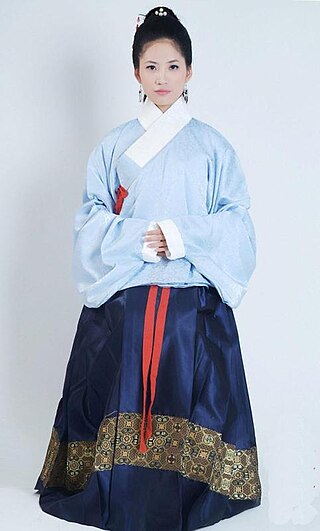Fuyao may refer to:
- Fuyao (fashion), designation for deviant garment items in imperial China
- Fuyao Group, Chinese glassmaking company
- Legend of Fuyao (Chinese:扶搖; pinyin:Fúyáo), 2018 Chinese TV series
- Fuyao Islands off the coast of Fuding, China
Fuyao may refer to:
Chinese may refer to:
English usually refers to:

Moraine is a city in Montgomery County, Ohio, United States. Situated on the banks of the Great Miami River, Moraine is an inner suburb of Dayton, Ohio and a part of the Dayton metropolitan area. The population was 6,393 at the 2020 census.

(Chinese: 福清; pinyin: Fúqīng; Wade–Giles: Fu2-ch'ing1; Pe̍h-ōe-jī: Hok-chhiaⁿ; Foochow Romanized: Hók-chiăng; also romanized as Hokchia) is a county-level city of Fujian Province, China, it is under the administration of the prefecture-level city of Fuzhou.
Ping may refer to:

LinkedIn is a business and employment-focused social media platform that works through websites and mobile apps. It was launched on May 5, 2003. Since December 2016, it has been a wholly owned subsidiary of Microsoft. The platform is primarily used for professional networking and career development, and allows jobseekers to post their CVs and employers to post jobs. From 2015 most of the company's revenue came from selling access to information about its members to recruiters and sales professionals. LinkedIn has more than 970 million registered members from over 200 countries and territories.

Chen Tuan 陳摶 was a Chinese Taoist credited with creation of the kung fu system Liuhebafa. Along with this internal art, he is also said to be associated with a method of qi (energy) cultivation known today as Taiji ruler and a 24-season Daoyin method using seated and standing exercises designed to prevent diseases that occur during seasonal changes throughout the year.

Moraine Assembly was a General Motors automobile factory in Moraine, Ohio, United States, a suburb of Dayton. A Frigidaire appliance plant had originally operated on the site from 1951 to 1979. Starting in 1981, the Chevrolet S-10 small pickup was produced. This same model was produced by Shreveport Assembly. In 1987 through 1994 the plant produced the rolling chassis for the Grumman LLV Postal Vehicle. From 2001 through 2008, the plant produced the GMT360 SUVs. The plant was closed in December 2008. In 2014, the facilities were acquired by Fuyao Glass to produce glass for vehicles.
Hong Meng, Hung Meng, or Hung Mung, literally the Vast Mist, is a character in the Daoist text Zhuangzi and a metaphor for the "primordial world, primeval chaos" in Chinese creation myths. Like many Zhuangist names, Hong Meng is a word play, translated as "Mists-of-Chaos", "Vast Obscurity", "Big Concealment", "Vital Principle", "Natural Energy" and "Big Goose Dummy".
Fengsu Tongyi, also known as Fengsu Tong (风俗通), is a book written about 195 AD by Ying Shao, who lived during the later Eastern Han period. The manuscript is similar to an almanac, which describes various strange and exotic matters of interest to the literati of the period, such as cultural practices, mystical beliefs, and musical instruments.

Ethan Juan is a Taiwanese actor and model. He rose to prominence with the television series Fated to Love You (2008). Juan won the Best Actor award at the 47th Golden Horse Awards for his role in Monga in 2010.

Ruqun is a set of attire in Hanfu which consists of a short jacket typically called ru worn under a long Chinese skirt called qun. However, when use as a general term, ruqun can broadly describe a set of attire which consists of a separated upper garment and a wrap-around lower skirt, or yichang, in which yi means the "upper garment" and the chang means the "lower garment". In a broad sense, ruqun can include the shanqun and aoqun in its definition.
Xianxia is a genre of Chinese fantasy heavily inspired by Chinese mythology and influenced by philosophies of Taoism, Chan Buddhism, Chinese martial arts, traditional Chinese medicine, Chinese folk religion, Chinese alchemy, other traditional elements of Chinese culture, and the wuxia genre.
Kao Fu-yao is a Taiwanese politician. He was the Deputy Minister of the Public Construction Commission since 20 May 2016.

Cao Dewang, also known as Cho Tak Wong or Tak Wong Cho, is a Chinese entrepreneur. He is the chairman of Fuyao Group, one of the largest glass manufacturers in the world. He is also a member of the Chinese People's Consultative Conference from Fujian, and chairman of both the China Automobile Glass Association and the Fujian Golf Players' Association.
Fuyao Glass Industry Group Co., Ltd. is a manufacturing company in the People's Republic of China, engaged in the production of float glass, automobile glass and construction glass. It is one of the largest auto glass producers in the world, with customers including large international automobile manufacturers such as Ford, General Motors, Subaru, and Volkswagen Group. It was established in 1987 as a joint venture company and is headquartered in Fuqing, Fujian. It was listed on the Shanghai Stock Exchange in 1993 and on the Hong Kong Stock Exchange in 2015.

American Factory is a 2019 American documentary film directed by Steven Bognar and Julia Reichert, about Chinese company Fuyao's factory in Moraine, a city near Dayton, Ohio, that occupies Moraine Assembly, a shuttered General Motors plant. The film had its festival premiere at the 2019 Sundance Film Festival. It is distributed by Netflix and is the first film acquired by Barack and Michelle Obama's production company, Higher Ground Productions. It won an Academy Award for Best Documentary Feature.
Leon Lai Yi, in Ganzhou, Jiangxi, China is a Chinese actor.
Lee Yin Yee is a Chinese billionaire and businessman, the founder and chairman of Xinyi Glass and Xinyi Solar.
Fuyao, sometimes translated as Fortune and prosperity in English, is an ancient Chinese concept with a negative connotation which was employed to refer to any garment items or clothing-style which was considered as being "strange clothing style" or "deviant dressing styles", or "aberrance in clothing" when compared to what was considered appropriate in the traditional Chinese clothing, Hanfu, system. It was also associated with fast changes in fashion styles. The concept of fuyao has appeared since the second century BC and its theoretical basis are derived from the Yin and yang principle as well as the Wuxing. The appearance of fuyao clothing was often associated with political and ecological upheaval. This concept of fuyao continued to be used even in the Qing dynasty.